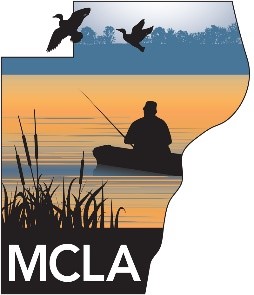
“Birds of our Waters”
Presentation at the Manitowoc County Lakes Association
“The Manitowoc County Lakes Association will protect and enhance the quality of area lakes and watersheds for the benefit of all.”
The Manitowoc County Lakes Association hosted its 20th annual Banquet this October 12th at Gill’s in Whitelaw, and the Keynote speaker was Jim Knicklebine, Naturalist, Writer and Executive Director of Woodland Dunes Nature Center and Preserve in Two Rivers.
Jim brought to life the history and present experience with images of the amazing birdlife in our area. He is an experienced birder with years of experience observing and writing about the natural world. Accompanied by beautiful images in his power point presentation, Jim shared his knowledge about our migratory feathered friends that inhabit and visit our County Lakes and wetlands.
Jim presented slides that made identification of our birds easier. The birds we can see in our county are either native, or invasive or related to both kinds. Quoting Aldo Leopold ‘A thing is right when it tends to preserve the integrity, stability, and beauty of the biotic community. It is wrong when it tends otherwise’, Jim made us aware of our participation in the world around us.
“People have changed the landscape. Up to 85% of the Earth’s surface has been altered by people – we have had a tremendous impact on the environment.”
Bordered by on of the largest lakes in the world, Manitowoc County has more than 50 lakes, providing important and much needed habitat habitat with open water, land between that and upland as well as marshes, which are key for nesting and migrating birds.
“There are about 300 species of birds that can be seen in and around our lakes. The lakes and the land around them are inseparable, and both should be appreciated and sustainably cared for.”
Concerning changes in bird population, one third of species are declining, one third are increasing and one third has stayed the same. As we are close to the Mississippi flyway, Jim showed a list of birds that migrate through our area. For instance, Canada Geese – he stressed ’not Canadian geese’ – were near extinction in the 1930s, re introduced in the 60s, and now estimated at three million. Now they contribute to Lake pollution from runoff of droppings, when they are grazing on mowed lawns on the shoreline. Shoreline Restoration with deeper rooted plants discourage geese from grazing.
The Tundra, Trumpeter and Mute Swans can be found here, as well as 29 species of Ducks. Loons are now on the increase, preferring native vegetation and good water clarity for finding fish. Of large birds we see Cormorants, White Pelicans, Herons, Egrets, Ospreys and Bald Eagles. In addition, about 20 species of Gulls, and Terns and Kingfishers depend on the quality of our waters, and fishing.
Insect catching birds like Martins and different kinds of Swallows, as well as song birds and many LBJ’s (Little Brown Jobs!), are migrant visitors that benefit from restoring backyard habitats with native plants. We were also treated to a picture of dozens of little items which a Crow brought to a girl who was feeding it. This was a bird that showed a sense of connection with a human.
We left the evening with a deepened appreciation and awareness of birdlife on our favorite lakes and streams. Jim inspired us to improve our backyard habitats to include food, water and cover for many kinds of birds.
The book ‘How to Manage Your Land to Help Birds’ by Vicky Piaskowski is free online.
On the MCLA website you can find a list of lacustrine birds, that is, birds that need wetlands associated with freshwater lakes and rivers, presented in March 2015, by Jim Knicklebine, for easy identification.
He can be contacted via the website nature@woodlanddunes.org.
You may also like
-
Preserve Wisconsin’s legacy: Renew the Knowles-Nelson Stewardship Program | Opinion
-
MANITOWOC COUNTY FISH & GAME UP-COMING EVENTS
-
NRA Files Amicus Brief in Challenge to Illinois’s Public Transit Carry Ban
-
Illinois Law Acknowledges Gun Possession Doesn’t Mean Pulling the Trigger
-
Manitowoc Unit – Manitowoc County Fish & Game New Event & Membership Drive
